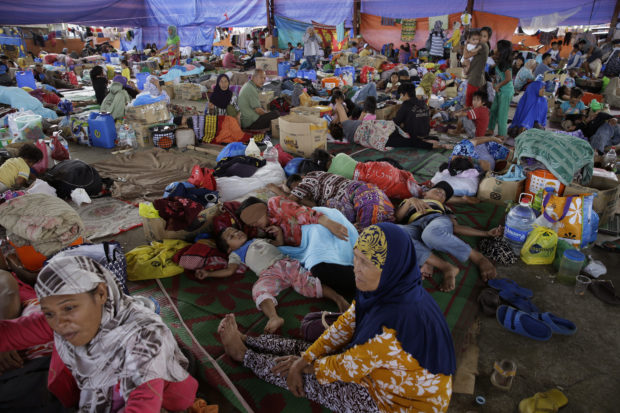
In this Friday, June 9, 2017, photo, evacuees stay at a crowded evacuation center on the outskirts of Marawi city, southern Philippines. Nearly every day for the past three weeks, the Philippine military has pounded the lakeside town of Marawi with rockets and bombs as it tries to wipe out militants linked to the Islamic State group in some of the most protracted urban combat to hit this volatile region in decades. (AP Photo/Aaron Favila)
ILIGAN CITY — With just a week before Eid al-Fitr, Malamit Maliawao sat on a pile of sacks inside the evacuation center at Iligan City School of Fisheries in Barangay Buru-un here on Sunday, thinking of how to celebrate the holiday.
Eid al-Fitr, which falls on June 26 this year, marks the end of the fasting month of Ramadan and is welcomed with great joy throughout the Muslim world.
“It is one of the most important celebrations for us, but we still don’t know how to go about it, especially because of our condition,” said Maliawao, who hails from Barangay Lilod in Marawi City.
No money
He said he was thinking of making an offering on Eid, but he had no money.
“During Eid, we give gifts to our children, our neighbors and to the pandita (village shamans/clerics). Without money, that would not be possible at all,” he said.
Maliawao said fasting was difficult at the crammed evacuation center, especially with the heat and humidity, complicated by the foul smell of garbage and open toilets, but the preparation for Eid was even more problematic for the evacuees.
‘Unthinkable’
“We can fast even with sardines and noodles but it is unthinkable for us to celebrate Eid with the same stuff,” he said.
“We’re happy that we can fast, but we’re also sad that we’re doing this obligation in this sorry condition,” he added.
Lalay Sultan Malo said this year’s Eid would be the first that she would celebrate in an evacuation center.
Until May 23, when gunmen from the Maute and Abu Sayyaf terrorist groups rampaged through Marawi, city residents like her had been living peacefully.
Like Christmas
The 47-year-old mother of six from Barangay Bubong a Madaya in Marawi, tried to explain how important Eid was for all Muslims.
“It’s like the Christians’ Christmas [to us],” she said.
“It is the time to thank Allah again for revealing the Quran to the Prophet Muhammad,” she added.
“Last year, we celebrated Eid with so much fanfare. But now, we don’t have anything yet for the feast. Our children have no new clothes yet and I don’t even have my prayer garb for the Eid prayer,” she said.
She pointed to two tents that the Office of the Presidential Assistant on the Peace Process (Opapp) had put up two days ago.
“We would probably pray there and not in the mosque in Marawi City,” she said.
For 49-year-old Sara Mamintal, a mother of eight from Barangay Marinaut, this year’s Eid would be sad.
“How can we possibly rejoice when our situation is like this? Eid has always been colorful and food is abundant but it is not possible this year. Unless we can go home, there would really be no celebration to speak of,” Mamintal said.
Comfort of home
She said that even with her husband’s meager income as a tricycle driver in Marawi City, Eid had always been a happy occasion for her family.
“Because we were in the comfort of our home,” she explained.
She said that even with the the tents, the daily obligatory prayers were not easy inside the evacuation center.
“I don’t even have a prayer garb,” she said as she put on an improvised prayer garb fashioned out of a duster.
According to Evelia Sumile of the Iligan City social welfare office, the evacuees at Buru-un, most of whom are Maranao, could stop worrying about Eid because the Opapp had lined up several activities for the big day.
“There will be food and everything,” she said.
Prayer garbs, malong
In a separate advisory, the Opapp said it would distribute prayer garbs to women in the evacuation center on Sunday, along with malong and underwear for Eid.
It said it had also prepared food for Sunday’s iftar (breaking of the fast) in five evacuation centers here and nearby areas.
But for Maliawao, he would rather be home, if possible before Eid.
“There are so many things to prepare and I can only do that when I am home,” he said.
“We wish we were home already,” Malo agreed.